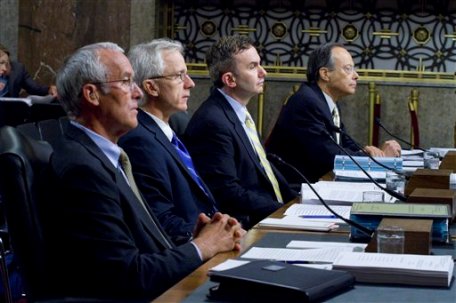Tells Congressional panel that the push to land bank fees -- along with lax government oversight and breakdown in communications -- resulted in abuses
Former credit rating industry executives told a Senate panel Friday that competitive pressures and poor internal communications led their analysts to award safe ratings to risky investments.
The highly rated investments turned out to be toxic, contributing to the financial crisis.
The chairman of a panel investigating the industry proposed Friday that Congress should address a conflict of interest that arises from credit rating agencies being paid by the same banks whose bonds they rate.
"It's like one of the parties in court paying the judge's salary," said Sen. Carl Levin, D-Mich. He said the financial regulatory overhaul the Senate will take up Monday should include a solution to that problem.
Levin was chairing a hearing of the Permanent Subcommittee on Investigations, which has been investigating the causes of the financial crisis.
He said credit rating agencies gave high ratings to risky investments before the financial crisis in part because they were competing for business from the banks.
Frank Raiter, a former managing director for Standard & Poor, said there was a "disconnect" between senior managers and the analytical managers responsible for assigning bond ratings. He said that, along with weak government regulation, led agencies to award high ratings to risky investments.
Raiter said management placed increasing pressure on analysts to earn fees by attracting business from banks. He said many former colleagues had quit after clashing with management.
When analysts "show the benefits of higher-quality rating criteria, and they come back and say, 'Revenues will go down,' you either (drop the issue and) continue to work there, or you quit," said former Standard & Poor managing director Frank Raiter.
Raiter also said weak government regulation led agencies to award high ratings to risky investments.
The Securities and Exchange Commission is prohibited by law from overseeing credit rating agencies. The agencies have escaped legal liability by claiming their ratings are protected by the First Amendment right to free speech.







